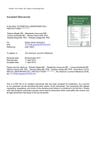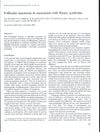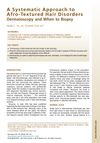 15 citations,
January 2020 in “Experimental Dermatology”
15 citations,
January 2020 in “Experimental Dermatology” The document concludes that understanding and treatments for alopecia areata have significantly advanced, now recognizing it as an autoimmune disorder.
[object Object]  306 citations,
April 2019 in “International Journal of Molecular Sciences”
306 citations,
April 2019 in “International Journal of Molecular Sciences” The skin has a complex immune system that is essential for protection and healing, requiring more research for better wound treatment.
127 citations,
January 2000 in “Journal of Investigative Dermatology” Cytotoxic T cells cause hair loss in chronic alopecia areata.
 January 2024 in “International Journal of Molecular Sciences”
January 2024 in “International Journal of Molecular Sciences” Blocking the protein CXCL12 with a specific antibody can increase hair growth in common hair loss conditions.
23 citations,
September 2020 in “Journal of Dermatological Science” Targeting Vδ1+T-cells may help treat alopecia areata.
 125 citations,
September 2001 in “The FASEB Journal”
125 citations,
September 2001 in “The FASEB Journal” Stress can cause hair loss by negatively affecting hair follicles and this effect might be reversed with specific treatments.
 11 citations,
December 1921 in “Archives of dermatology and syphilology”
11 citations,
December 1921 in “Archives of dermatology and syphilology” A rare scalp disease causes hair loss, pus-filled nodules, and scarring.
 May 2024 in “Frontiers in Immunology”
May 2024 in “Frontiers in Immunology” Type-2 immunity may influence skin diseases and could be targeted for treatment.
 9 citations,
February 2022 in “Nature communications”
9 citations,
February 2022 in “Nature communications” Rare changes in the KRT82 gene are linked to a higher risk of Alopecia Areata.
 9 citations,
July 2002 in “Journal of the European Academy of Dermatology and Venereology”
9 citations,
July 2002 in “Journal of the European Academy of Dermatology and Venereology” The document concludes that fexofenadine reduces inflammation in chronic hives, cholestyramine helps half of pregnant women with itchy rashes, and relaxing incisions are a good alternative in facial surgery for the elderly.
 34 citations,
October 2017 in “Archivos Argentinos De Pediatria”
34 citations,
October 2017 in “Archivos Argentinos De Pediatria” Alopecia Areata is a complex, unpredictable autoimmune hair loss condition with limited treatment options and a significant psychological impact.
 4 citations,
February 2020 in “Journal of Cosmetic Dermatology”
4 citations,
February 2020 in “Journal of Cosmetic Dermatology” Trichoscopy helps diagnose hairline recession causes in Egyptian women, with androgenetic alopecia being the most common.
 3 citations,
January 2012 in “Elsevier eBooks”
3 citations,
January 2012 in “Elsevier eBooks” Burn scars form abnormally due to changes in wound healing, and more research is needed to improve treatments.
 2 citations,
March 2015 in “Expert opinion on orphan drugs”
2 citations,
March 2015 in “Expert opinion on orphan drugs” New treatments for hair loss show promise but need more research to confirm safety and effectiveness.
 December 2021 in “Research Square (Research Square)”
December 2021 in “Research Square (Research Square)” M-CSF-stimulated myeloid cells can cause alopecia areata in mice.
 57 citations,
March 2019 in “Immunity”
57 citations,
March 2019 in “Immunity” The document concludes that the skin's immune system is complex, involving interactions with hair follicles, nerves, and microbes, and can protect or cause disease, offering targets for new treatments.
 27 citations,
April 2017 in “British Journal of Dermatology”
27 citations,
April 2017 in “British Journal of Dermatology” Hair loss involves immune responses, inflammation, and disrupted signaling pathways.
 66 citations,
March 2018 in “British journal of dermatology/British journal of dermatology, Supplement”
66 citations,
March 2018 in “British journal of dermatology/British journal of dermatology, Supplement” An imbalance between certain immune cells is linked to a chronic skin condition and may be influenced by obesity, smoking, and autoimmune issues.

research Acne
4 citations,
January 2019 Acne is a common skin condition that can be influenced by diet, lifestyle, and hormones, and requires a treatment approach that includes psychological considerations.
 65 citations,
February 2017 in “Pflügers Archiv - European Journal of Physiology”
65 citations,
February 2017 in “Pflügers Archiv - European Journal of Physiology” Macrophages are vital for skin healing, hair growth, salt balance, and cancer defense.
 3 citations,
May 2018 in “The American Journal of Medicine”
3 citations,
May 2018 in “The American Journal of Medicine” A woman's long-term scalp issues were diagnosed as a rare skin disorder called cutaneous Langerhans cell histiocytosis.
701 citations,
August 2014 in “Nature medicine” Alopecia areata can be reversed by JAK inhibitors, promoting hair regrowth.
15 citations,
January 2022 in “Immune Network/Immune network” New targeted immunotherapies are improving treatment for inflammatory skin diseases.
79 citations,
December 2013 in “Journal of Investigative Dermatology Symposium Proceedings” Alopecia areata may be treated by restoring hair follicle immune privilege and adjusting immune responses.
51 citations,
December 2017 in “Skin Appendage Disorders” Stress may trigger hair loss by affecting immune protection in hair follicles.
 17 citations,
May 1987 in “Clinical and Experimental Dermatology”
17 citations,
May 1987 in “Clinical and Experimental Dermatology” A patient with Sézary syndrome showed improvement after treatment and the study suggested follicular mucinosis might indicate future lymphoma risk.
 67 citations,
January 2020 in “Cellular & Molecular Immunology/Cellular & molecular immunology”
67 citations,
January 2020 in “Cellular & Molecular Immunology/Cellular & molecular immunology” Tissue-resident memory T cells can protect against infections and cancer but may also contribute to autoimmune diseases.
 January 2011 in “International Journal of Trichology”
January 2011 in “International Journal of Trichology” The document concludes that doctors should recognize congenital triangular alopecia to avoid unnecessary treatments, as it does not respond to steroids like alopecia areata does.
 375 citations,
July 2006 in “Journal of Investigative Dermatology”
375 citations,
July 2006 in “Journal of Investigative Dermatology” Stress can worsen skin and hair conditions by affecting the skin's immune response and hormone levels.
[object Object]  16 citations,
April 2014 in “Dermatologic Clinics”
16 citations,
April 2014 in “Dermatologic Clinics” Dermatoscopy helps diagnose hair and scalp disorders in people with Afro-textured hair, but more research is needed for better understanding and treatment.
























